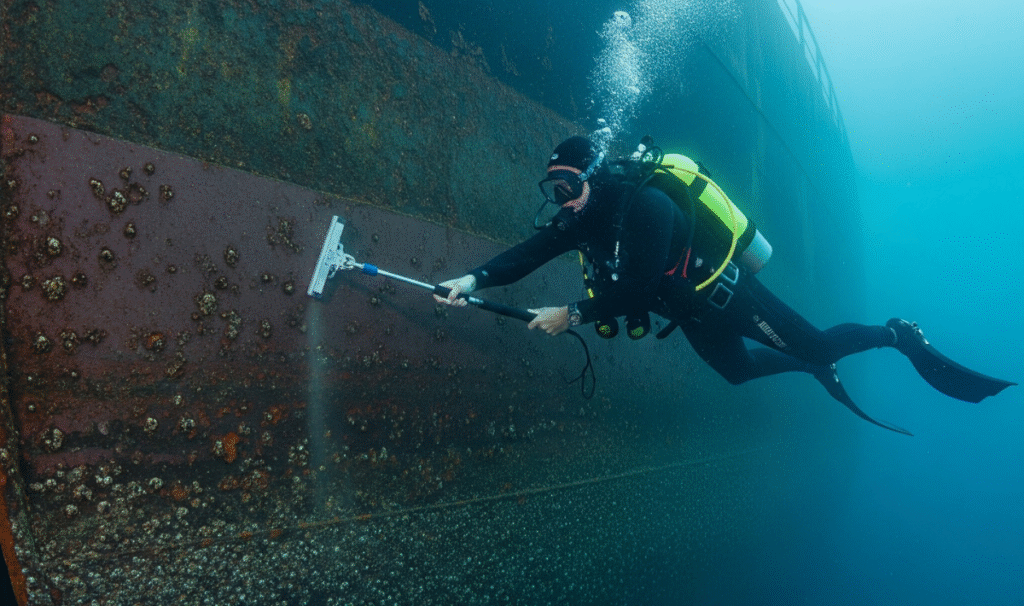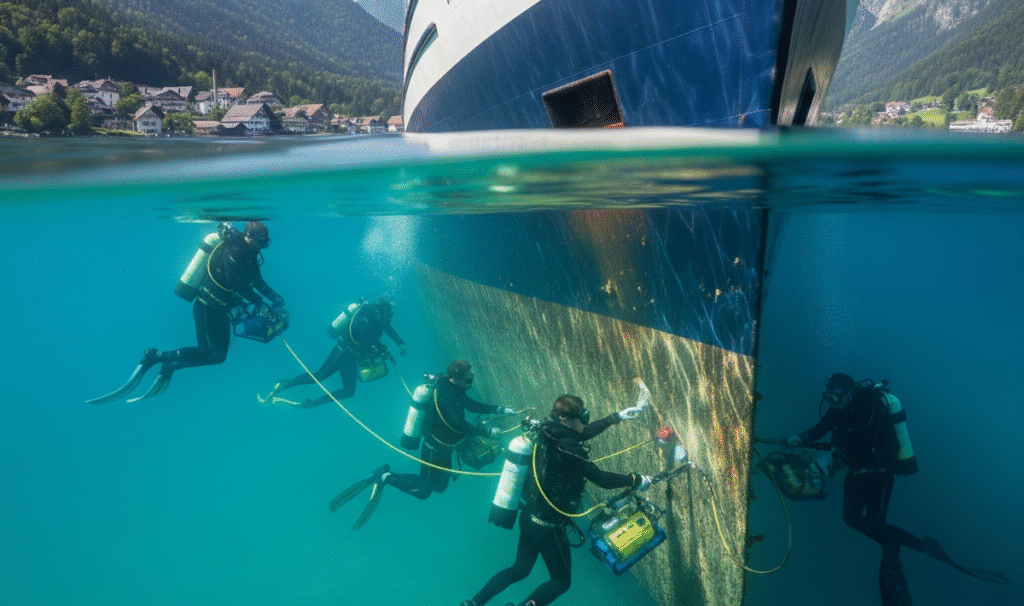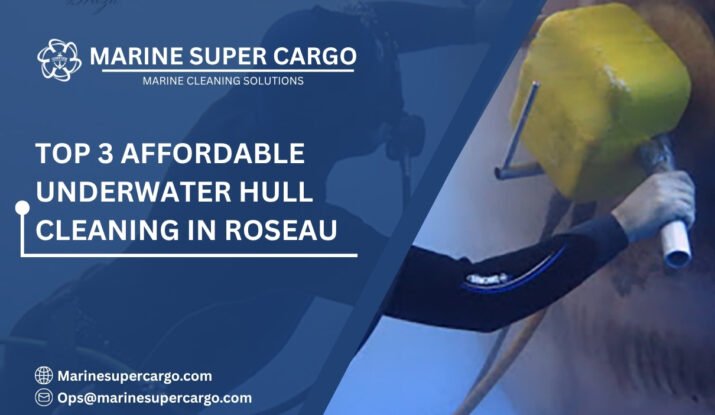When you think of ship maintenance, you probably picture dry docks, welding, or surface painting. But one of the most important and often overlooked tasks happens beneath the waterline—keeping a vessel’s hull clean. Biofouling, the accumulation of algae, barnacles, and other marine organisms, might look harmless, but it can quietly rob your ship of efficiency, devour fuel budgets, and even cause compliance headaches. That’s why underwater hull cleaning in Roseau has become a must-do practice for ship owners and operators passing through the Caribbean’s vibrant waters.
In this guide, we’ll uncover why hull cleaning is as essential as topping up fuel, why Roseau is an ideal hub for it, the benefits it brings to efficiency and compliance, and how innovations are reshaping its future.
Why Hull Cleaning Matters
Think of your ship as a long-distance runner. A smooth hull is like lightweight running shoes, but over time, marine growth clings to the vessel and turns those shoes into boots filled with mud. The result? More drag, higher energy demands, and slower speeds.
By investing in underwater hull cleaning in Roseau, you’re essentially giving your vessel a fresh start every few months. The benefits are immediate:
- Reduced drag, smoother sailing
- Lower engine workload, saving fuel
- Enhanced maneuverability for tighter port entries
- Compliance with international energy-efficiency rules
The cleaner the hull, the less resistance, and that translates directly into dollars saved.
Roseau: A Caribbean Maritime Gateway
Roseau, the capital of Dominica, might be known for its natural beauty, but it also plays a crucial role in Caribbean maritime activity. Serving cargo vessels, cruise ships, and transiting traffic, the city’s port infrastructure makes it a practical location for maritime services.
Ships already calling at Roseau for refueling or cargo runs can easily schedule underwater hull cleaning in Roseau without disrupting their itineraries. And in Caribbean waters, where biofouling accelerates due to warmer temperatures, timely hull cleaning becomes even more vital to keep operations on track.

Understanding Biofouling
Marine organism growth on ships is not just cosmetic—it’s a serious operational issue. Let’s break down how fouling affects vessels:
- Slime biofilm: A thin layer of microorganisms that forms quickly and allows bigger organisms to attach.
- Barnacles and mussels: Hard shells that massively increase hydrodynamic drag.
- Algae growth: Creates resistance and leads to corrosion under protective paint.
- Corrosion accelerants: Fouling traps moisture, making coatings degrade quickly.
Routine underwater hull cleaning in Roseau removes these layers before they pile onto each other and create a drag-inducing nightmare.
Compliance with Global Maritime Standards
Today’s shipping world is governed by strict international standards, and hull maintenance plays a surprising role in meeting them. Organizations like the International Maritime Organization (IMO) and conventions like MARPOL focus on reducing emissions and controlling invasive species transfer.
Here’s how underwater hull cleaning in Roseau ties in with compliance:
- IMO Biofouling Guidelines: Encourage regular monitoring and cleaning to avoid transporting species across borders.
- MARPOL Annex VI: Emphasizes energy efficiency and stricter emission controls—keeping hulls clean contributes directly to meeting these rules.
- IMCA Standards: Provide diver safety regulations during underwater cleaning works.
Compliance isn’t an option—it’s an operational and legal necessity in today’s maritime world, and cleaning your hull is part of meeting that standard.
The Environmental Benefits
The Caribbean ecosystem is delicate and diverse. A fouled hull doesn’t just cost a ship more fuel—it can unintentionally introduce invasive species that threaten local marine life.
Eco-friendly underwater hull cleaning in Roseau provides dual benefits—saving money and saving biodiversity. Responsible operators use containment systems to capture removed debris, reducing risks of pollution and species spread. This means vessel operators protect both the marine ecosystem and their bottom line.
Benefits include:
- Decreased carbon footprint from reduced fuel consumption
- Controlled biofouling waste disposal
- Longer-lasting antifouling coatings, reducing chemical reapplications
- Preserved biodiversity in Dominica’s waters
Cost Savings That Count
Fuel accounts for more than half of most ship owners’ operating costs. Fouled hulls can increase fuel burn by as much as 40%. That’s like driving with a trailer you don’t need.
By prioritizing underwater hull cleaning in Roseau, ship managers and owners can enjoy:
- 10–15% reductions in fuel costs per voyage
- Extended time intervals between drydockings
- Lower long-term hull maintenance expenses
- Avoidance of costly emissions penalties
Look at hull cleaning as preventative healthcare: small, regular check-ups save you from massive medical bills later.
How Hull Cleaning Works
The cleaning process in Roseau combines human expertise with carefully engineered equipment. Professional divers or remotely operated vehicles (ROVs) carry out the job under strict safety codes.
A typical underwater hull cleaning in Roseau includes:
- Inspection phase – Divers or ROVs perform underwater assessments with cameras.
- Mechanical cleaning – Brushes of varying stiffness remove slime, barnacles, and algae.
- Propeller polishing – Boosts propulsion efficiency and reduces cavitation damage.
- Post-clean documentation – Video or photo evidence is often provided to ship operators.
This process not only optimizes performance but also serves as compliance proof for international inspectors.
Safety in Focus
Diver safety is central to hull cleaning. Operators in Roseau follow IMCA safety protocols covering everything from air supply checks to emergency recovery systems.
Safety measures include:
- Medical checks for divers before dives
- Standardized communication and air supply equipment
- Emergency standby divers during operations
- Strict observance of decompression guidelines
That’s why professional underwater hull cleaning in Roseau is reliable, efficient, and safe for all stakeholders involved.
Innovation and the Future of Hull Cleaning
Technology is rapidly reshaping offshore and maritime services, and hull cleaning is no exception. While divers continue to play a vital role, automation and robotics are becoming more prominent in the industry.
Innovation trends in underwater hull cleaning in Roseau include:
- Robotic scrubbers with AI-driven navigation systems
- Waste capture devices that filter debris to prevent spreading
- Hull performance monitoring sensors to predict fouling rates
- Eco-friendly antifouling coatings designed for longer-lasting hull protection
The next decade will likely see robotic hull cleaning become standard practice, especially in environmentally sensitive zones like the Caribbean.

Choosing the Right Provider in Roseau
Not all hull cleaning services are created equal. Ship operators need to choose reliable professionals who align with IMO and IMCA guidelines. Key qualities of good providers include:
- Certified divers with a solid track record
- Video-supported inspection and reporting
- Responsible waste management systems
- Knowledge of international compliance standards
With the right partner, underwater hull cleaning in Roseau transforms from routine maintenance into a powerful cost-saving and compliance tool.
Conclusion
In shipping, time is money—but so is fuel efficiency. A fouled hull silently inflates costs, strains engines, and increases emissions. Opting for underwater hull cleaning in Roseau addresses all these pain points by boosting performance, cutting expenses, ensuring compliance, and protecting marine ecosystems.
For ship owners, operators, and managers navigating the waters of the Caribbean, keeping hulls clean in Roseau is more than maintenance—it’s a competitive advantage. And as innovations continue to shape the future, hull cleaning will only become smarter, safer, and greener.
Similar market advantages are discussed in underwater hull cleaning in the UK.
FAQ:
Q1. Why is underwater hull cleaning in Roseau especially important in tropical waters?
Because warm Caribbean seas accelerate biofouling growth, vessels require more frequent cleaning to avoid heavy drag and fuel penalties.
Q2. What is included in the cleaning process?
It usually includes pre-inspection, mechanical cleaning, propeller polishing, and post-clean reporting.
Q3. How much fuel can cleaning really save?
On average, vessels save between 10 and 15% in fuel costs, sometimes even more, depending on how fouled the hull had become.
Q4. Is underwater hull cleaning environmentally friendly in Roseau?
Yes, especially when performed by providers who use waste-collection systems to prevent removed organisms from contaminating the water.
Q5. Are robots replacing divers for hull cleaning?
Not entirely. While robotic systems are on the rise, divers still play a critical role in detailed cleaning, inspections, and complex vessel structures.


